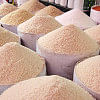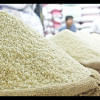New Indian duty unlikely to affect local rice market

India's move to impose a 20 percent duty on exports of parboiled rice is unlikely to affect Bangladesh's grain market immediately, two rice millers said today, as the country has 'adequate' stock of the staple because of increased production.
The neighbouring country slapped the export duty with immediate effect, a move that could further reduce shipments from the world's largest exporter and lift global rice prices, which are already trading near their highest levels in 12 years, news agency Reuters said in its report today.
Last month, India surprised buyers by imposing a ban on exports of widely consumed non-basmati white rice, following a ban on broken rice exports last year.
"We have adequate stock rice this year. Any effect on domestic prices is unlikely," said Nirod Boron Saha, president of the Rice and Paddy Stockists and Wholesalers Association in Noagaon, a major rice wholesale hub in the north.
In 2022-23 fiscal year, Bangladesh's public and private sector imported 10.55 lakh tonnes of rice, mainly parboiled rice, and most of them came from India based on import permits issued by the food ministry.
The grains were imported at over 15 percent import duty until March 31 this year.
The total import tariff for rice import is now 62.5 percent as the National Board of Revenue (NBR) did not extend the reduced duty benefit.
Both public and private sectors have enough stock of rice this year, said Chitta Majumder, managing director of the Majumder Group of Industries, which imports rice from India apart from its purchase from domestic market for milling.
"There will be no immediate effect on the market. And if farmers can harvest the Aman crop in November-December period without any natural calamity, there will no deficit of food grain here," he said.
The Directorate General of Food has a stock of 18.31 lakh tonnes of food grains with rice accounting for nearly 16 lakh tonnes.
"We have a good production of rice in the previous seasons," he said.
Rice production estimate for the full fiscal year (FY) of 2022-23 is yet to be released by the Bangladesh Bureau of Statistics (BBS).
However, if estimates of production of the Boro season rice crop by the Department of Agricultural Extension is taken into account, total production might rise 5 percent to 4 crore tonnes in fiscal year 2022-23.
By the end of last week, the US Department of Agriculture said farmers bagged 2 crore tonnes of Boro rice, harvested in April-May period early this calendar year.
Chitta said he and his brothers have a stock nearly 25000-30,000 tonnes of imported rice, and they would incur loss at present market prices in Bangladesh.
The maximum retail price of coarse rice, a benchmark variety which is consumed mainly by the poor and low-income people, was Tk 50 a kilogramme in Dhaka, down 2 percent from Tk 52 a month ago, according to prices data compiled by the Trading Corporation of Bangladesh.

 For all latest news, follow The Daily Star's Google News channel.
For all latest news, follow The Daily Star's Google News channel. 








Comments